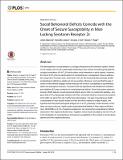Social Behavioral Deficits Coincide with the Onset of Seizure Susceptibility in Mice Lacking Serotonin Receptor 2c
Author(s)
Sejourne, Julien; Llaneza, Danielle; Kuti, Orsolya J.; Page, Damon T.
DownloadSejourne-2015-Social Behavioral De.pdf (1.322Mb)
PUBLISHER_CC
Publisher with Creative Commons License
Creative Commons Attribution
Terms of use
Metadata
Show full item recordAbstract
The development of social behavior is strongly influenced by the serotonin system. Serotonin 2c receptor (5-HT[subscript 2c]R) is particularly interesting in this context considering that pharmacological modulation of 5-HT[subscript 2c]R activity alters social interaction in adult rodents. However, the role of 5-HT[subscript 2c]R in the development of social behavior is unexplored. Here we address this using Htr2c knockout mice, which lack 5-HT[subscript 2c]R. We found that these animals exhibit social behavior deficits as adults but not as juveniles. Moreover, we found that the age of onset of these deficits displays similar timing as the onset of susceptibility to spontaneous death and audiogenic-seizures, consistent with the hypothesis that imbalanced excitation and inhibition (E/I) may contribute to social behavioral deficits. Given that autism spectrum disorder (ASD) features social behavioral deficits and is often co-morbid with epilepsy, and given that 5-HT[subscript 2c]R physically interacts with Pten, we tested whether a second site mutation in the ASD risk gene Pten can modify these phenotypes. The age of spontaneous death is accelerated in mice double mutant for Pten and Htr2c relative to single mutants. We hypothesized that pharmacological antagonism of 5-HT[subscript 2c]R activity in adult animals, which does not cause seizures, might modify social behavioral deficits in Pten haploinsufficient mice. SB 242084, a 5-HT[subscript 2c]R selective antagonist, can reverse the social behavior deficits observed in Pten haploinsufficient mice. Together, these results elucidate a role of 5-HT[subscript 2c]R in the modulation of social behavior and seizure susceptibility in the context of normal development and Pten haploinsufficiency.
Date issued
2015-08Department
Massachusetts Institute of Technology. Department of Brain and Cognitive Sciences; Picower Institute for Learning and MemoryJournal
PLOS ONE
Publisher
Public Library of Science
Citation
Sejourne, Julien, Danielle Llaneza, Orsolya J. Kuti, and Damon T. Page. “Social Behavioral Deficits Coincide with the Onset of Seizure Susceptibility in Mice Lacking Serotonin Receptor 2c.” Edited by Makoto Sato. PLoS ONE 10, no. 8 (August 26, 2015): e0136494.
Version: Final published version
ISSN
1932-6203